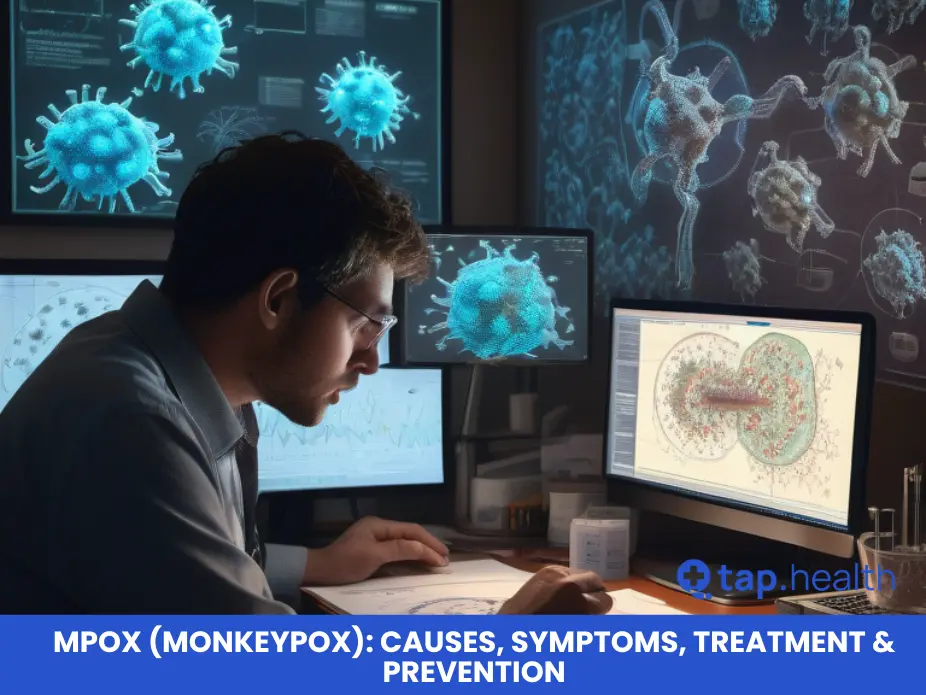Mpox, which used to be called monkeypox, is a rare illness caused by the mpox virus. Public health groups focus on control and prevention to tackle this new infectious disease. This article gives a clear insight into mpox. It includes information about what causes it, how it spreads, what symptoms to look for, how it is diagnosed, and ways to prevent it.
What is Mpox (Monkeypox)?
Mpox, commonly known as Monkeypox, is a rare viral disease that belongs to the same family of viruses as smallpox, called the Orthopoxvirus. Although it is similar to smallpox, Monkeypox is less severe. This virus was first discovered in monkeys in 1958, which is why it got the name “Monkeypox.” However, the first human case was recorded in 1970 in the Democratic Republic of Congo.
Monkeypox primarily occurs in tropical rainforest areas of Central and West Africa, but it can also spread to other regions. While it shares some symptoms with smallpox, like fever and rash, Monkeypox is usually milder and not as deadly.
Where is Mpox (Monkeypox) Found?
Monkeypox is mostly found in Central and West Africa, particularly in countries like Nigeria, the Democratic Republic of Congo, and the Central African Republic. These regions have experienced occasional outbreaks of the disease. In recent years, cases have also been reported in non-endemic countries like the United States, the United Kingdom, and several European countries. This spread is often linked to travel or the importation of infected animals.
Who Does Mpox (Monkeypox) Affect?
Monkeypox can affect both humans and animals. In humans, it can affect anyone, but certain groups are more at risk.
These include:
- People living in or traveling to areas where Monkeypox is common: These individuals are at a higher risk of contracting the virus due to increased exposure.
- Healthcare workers and caregivers: They may be at risk if they are in close contact with an infected person without proper protective measures.
- Children: Younger individuals tend to experience more severe symptoms compared to adults.
- People with weakened immune systems: Individuals with compromised immune systems may have a higher risk of complications from the disease.
Types of Mpox (Monkeypox)
types
There are two main types, or clades, of the Monkeypox virus:
- Central African (Congo Basin) Clade: This type is more severe, with a higher fatality rate, and it can spread more easily from person to person.
- West African Clade: This type is generally milder, with a lower fatality rate, and human-to-human transmission is less common.
Stages of Mpox (Monkeypox)
Monkeypox infection progresses through several stages:
1.Invasion Period (0-5 days):
This stage is characterized by fever, intense headache, swelling of the lymph nodes, back pain, muscle aches, and severe lack of energy.
2.Skin Eruption Period (1-3 days after fever onset):
The rash appears, typically starting on the face and then spreading to other parts of the body, including the palms of the hands and the soles of the feet. The rash progresses through different stages, from macules (flat lesions) to papules (raised lesions), vesicles (fluid-filled lesions), pustules (pus-filled lesions), and finally scabs.
Mpox (Monkeypox) Symptoms
Symptoms
Symptoms of Monkeypox can appear anywhere from 5 to 21 days after exposure to the virus. They are typically divided into two periods:
- Initial Symptoms:
- Fever
- Headache
- Muscle aches
- Backache
- Swollen lymph nodes
- Chills
- Exhaustion
- Rash Development: A rash usually begins on the face and then spreads to other parts of the body. The rash goes through several stages, from flat, red bumps to raised, fluid-filled blisters, which eventually crust over and fall off. The rash can be itchy or painful.
The illness usually lasts for 2 to 4 weeks, with most people recovering without treatment. However, in some cases, the symptoms can be more severe, especially in children, pregnant women, and individuals with weakened immune systems.
Causes of Mpox (Monkeypox)
Monkeypox is caused by the Monkeypox virus, which is part of the Orthopoxvirus genus. The virus can spread to humans through several routes:
1. Animal-to-Human Transmission:
This is the most common way people get infected. The virus can be transmitted through direct contact with the blood, bodily fluids, or skin or mucosal lesions of infected animals. In Africa, the virus has been found in many animals, including rope squirrels, tree squirrels, Gambian pouched rats, dormice, and various species of monkeys. Eating undercooked meat or other products from infected animals can also spread the virus.
2. Human-to-Human Transmission:
While less common, Monkeypox can also spread from person to person. This can happen through respiratory droplets, which require prolonged face-to-face contact, or through contact with infected bodily fluids, lesion material, or contaminated materials like bedding or clothing.
How Do You Catch Mpox?
You can catch Monkeypox in several ways:
- Direct contact with an infected animal: This includes handling animals, getting bitten or scratched, or preparing bush meat.
- Human-to-human contact: If you have close physical contact with an infected person, such as touching their rash or lesions, you could catch the virus.
- Contaminated objects: Touching clothing, bedding, or other objects that have been contaminated with the virus can also spread the disease.
Monkeypox is not as contagious as some other diseases like the flu or COVID-19, but it’s still important to take precautions, especially in areas where the virus is present.
Risk Factors of Mpox (Monkeypox)
Certain factors can increase your risk of getting Monkeypox:
- Living in or traveling to endemic areas: Being in Central or West Africa, where Monkeypox is more common, puts you at a higher risk.
- Contact with wild animals: Handling or consuming wild animals, particularly those known to carry the virus, increases your risk.
- Close contact with an infected person: Caring for someone with Monkeypox or having close physical contact with them can lead to infection.
- Lack of smallpox vaccination: The smallpox vaccine provides some protection against Monkeypox, so people who haven’t been vaccinated may be more vulnerable.
Complications of Mpox (Monkeypox)
While most people recover from Monkeypox without treatment, complications can occur, especially in severe cases. These may include:
- Secondary bacterial infections: Skin lesions can become infected with bacteria, leading to further complications.
- Bronchopneumonia: A lung infection that can develop as a complication of Monkeypox.
- Sepsis: A severe infection that spreads throughout the body, potentially leading to organ failure.
- Encephalitis: Inflammation of the brain, which can cause long-term neurological problems.
- Vision loss: If the eye is affected by the rash or lesions, it can lead to vision problems or even blindness.
Children, pregnant women, and individuals with weakened immune systems are at a higher risk of developing complications.
Diagnosis of Mpox (Monkeypox)
Diagnosing Monkeypox involves several steps:
- Clinical Evaluation: A healthcare provider will assess your symptoms, such as the characteristic rash, fever, and lymph node swelling.
- Laboratory Tests: Samples from skin lesions, blood, or respiratory secretions may be collected and tested to confirm the presence of the Monkeypox virus.
- Polymerase Chain Reaction (PCR) Testing: This is the most accurate test for detecting the Monkeypox virus. It involves analyzing the genetic material of the virus from a sample.
- Serology Tests: These tests can detect antibodies in the blood that indicate a recent or past infection.
It’s important to see a doctor if you suspect you have Monkeypox, especially if you’ve been in contact with an infected person or animal.
Treatment for Mpox (Monkeypox)
There is no specific treatment for Monkeypox, but most people recover with supportive care. The treatment focuses on relieving symptoms and preventing complications:
- Rest and hydration: Getting plenty of rest and drinking fluids can help your body fight off the infection.
- Pain relievers and fever reducers: Medications like acetaminophen or ibuprofen can help reduce fever and alleviate pain.
- Antiviral medications: In some cases, antiviral drugs like tecovirimat (TPOXX) may be used to treat severe cases of Monkeypox, especially in immunocompromised patients.
- Wound care: Keeping the rash and lesions clean and dry can prevent secondary bacterial infections. In some cases, antibiotics may be prescribed if a bacterial infection occurs.
It’s important to follow your healthcare provider’s advice and avoid spreading the virus to others while you’re recovering.
How Can I Prevent Mpox (Monkeypox)?
Prevention is key to avoiding Monkeypox. Here are some steps you can take to protect yourself:
- Avoid contact with wild animals: Refrain from handling animals that could carry the virus, such as monkeys, rodents, and other mammals, especially in regions where Monkeypox is common.
- Practice good hygiene: Wash your hands regularly with soap and water, and avoid touching your face with unwashed hands.
- Cook meat thoroughly: If you eat meat from wild animals, make sure it’s cooked thoroughly to kill any potential viruses.
- Use personal protective equipment (PPE): Healthcare workers and caregivers should use PPE, such as gloves and masks, when caring for patients with Monkeypox.
- Get vaccinated: The smallpox vaccine can provide some protection against Monkeypox. In some countries, it may be recommended for people at high risk of exposure.
What Should You Eat If You Have Mpox (Monkeypox)?
A balanced diet can help support your immune system during recovery from Monkeypox. Focus on:
- Hydration: Drink plenty of water, herbal teas, and clear broths to stay hydrated.
- Nutrient-rich foods: Include fruits, vegetables, whole grains, lean proteins, and healthy fats in your diet to give your body the nutrients it needs to fight the infection.
- Soft foods: If you have mouth sores, eating soft, bland foods like yogurt, mashed potatoes, and oatmeal may be more comfortable.
- Avoid irritants: Spicy, acidic, or rough-textured foods can irritate mouth sores, so it’s best to avoid them.
When to See a Doctor
You should see a doctor if you:
- Have been in contact with someone who has Monkeypox or has traveled to an area where the virus is common.
- Experience symptoms like fever, rash, or swollen lymph nodes.
- Have a weakened immune system or are pregnant and suspect you have Monkeypox.
Early diagnosis and treatment can help prevent complications and reduce the risk of spreading the virus to others.
FAQ on Mpox (Monkeypox)
Q: What are the early signs of Monkeypox?
A: The early signs include fever, headache, muscle aches, and swollen lymph nodes. A rash usually develops a few days after these symptoms start.
Q: Can Monkeypox be transmitted from person to person?
A: Yes, Monkeypox can be transmitted from person to person through close contact with respiratory droplets, bodily fluids, or contaminated objects.
Q: Is there a vaccine for Monkeypox?
A: Yes, the smallpox vaccine provides some protection against Monkeypox. In some countries, it may be recommended for people at high risk of exposure.
Reference
For further reading and detailed information, refer to the following sources:



